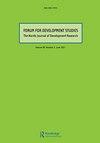通过知识对话恢复粮食系统弹性:来自墨西哥的案例研究
IF 1.1
Q3 DEVELOPMENT STUDIES
引用次数: 0
摘要
全球经济动态使许多领土边缘化,而这些领土具有在其领土能力范围内产生发展可能性的属性。如果社会行动者之间进行思想交流,即知识对话,就可以克服领土内外的不对称。基于这一逻辑,本研究旨在重视知识对话作为制度弹性的动态工具,以不同的形式促进发展。制度弹性可以理解为特定领土内的信仰、价值观和传统体系产生由历史传承的文化表现形式驱动的变化的适应能力,在大多数情况下,这种变化创造了产生个人和集体福祉的环境。最后得出的结论是,知识对话是一种工具,能够在参与者之间推广新知识,促进领土的发展,从而恢复具有复原力的粮食系统。本文章由计算机程序翻译,如有差异,请以英文原文为准。
Restoring the Food Systems Resilience Through the Dialogue of Knowledge: A Case Study from Mexico
Abstract
Global economic dynamics have marginalized many territories, and these have attributes that can generate development possibilities in the context of their territorial capacities. Asymmetries within and outside the territories can be overcome if there is an exchange of ideas between social actors, i.e. a dialogue of knowledge. Based on this logic, this study aims to value the dialogue of knowledge as a dynamic tool of institutional resilience to promote development in its different expressions. Institutional resilience can be understood as the adaptive capacity of a system of beliefs, values and traditions in a specific territory to generate changes driven by historically inherited cultural expressions, which in most cases creates environments that produce individual and collective well-being. It is concluded that the dialogue of knowledge is a tool capable of promoting new knowledge among its participants and promoting development in the territories, allowing for a recovery of resilient food systems.
求助全文
通过发布文献求助,成功后即可免费获取论文全文。
去求助
来源期刊

FORUM FOR DEVELOPMENT STUDIES
DEVELOPMENT STUDIES-
CiteScore
1.80
自引率
14.30%
发文量
24
期刊介绍:
Forum for Development Studies was established in 1974, and soon became the leading Norwegian journal for development research. While this position has been consolidated, Forum has gradually become an international journal, with its main constituency in the Nordic countries. The journal is owned by the Norwegian Institute of International Affairs (NUPI) and the Norwegian Association for Development Research. Forum aims to be a platform for development research broadly defined – including the social sciences, economics, history and law. All articles are double-blind peer-reviewed. In order to maintain the journal as a meeting place for different disciplines, we encourage authors to communicate across disciplinary boundaries. Contributions that limit the use of exclusive terminology and frame the questions explored in ways that are accessible to the whole range of the Journal''s readership will be given priority.
 求助内容:
求助内容: 应助结果提醒方式:
应助结果提醒方式:


